Aamc fl 2 chem - Study guides, Class notes & Summaries
Looking for the best study guides, study notes and summaries about Aamc fl 2 chem? On this page you'll find 27 study documents about Aamc fl 2 chem.
Page 2 out of 27 results
Sort by
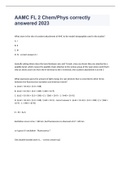
-
AAMC FL 2 Chem/Phys correctly answered 2023
- Exam (elaborations) • 20 pages • 2023
- Available in package deal
-
- $14.99
- + learn more
AAMC FL 2 Chem/Phys correctly answered 2023What atom is the site of covalent attachment of AMC to the model tetrapeptide used in the studies? A. I B. II C. III D. IV - correct answer A. I basically asking where does the bond between amc and Y break. since you know they are attached by a peptide bond, which means the peptide chain attaches to the amino group of the next amino acid( that's why an amino acid runs from the N-terminal to the C-terminal), the covalent attachment is at site 1 ...
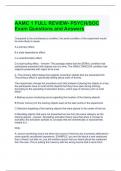
-
MCAT AAMC FL /AAMC FL Exam Bundle
- Package deal • 36 items • 2024
-
- $42.49
- + learn more
1 Exam (elaborations) MCAT AAMC practice exam Chem Phys Exam Questions and Answers 2024 2 Exam (elaborations) MCAT AAMC FL 1EXAM QUESTIONS AND ANSWERS / GRADED A 3 Exam (elaborations) Fl5 AAMC [511] Exam with complete solutions 4 Exam (elaborations) FL 5 AAMC MCAT Exam Questions and Answers 2024 5 Exam (elaborations) C-P AAMC Fl #3 Exam Questio
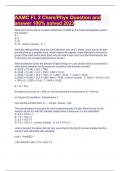
-
AAMC FL 2 Chem/Phys Question and answer 100% solved 2023
- Exam (elaborations) • 14 pages • 2023
- Available in package deal
-
- $16.49
- + learn more
AAMC FL 2 Chem/Phys Question and answer 100% solved 2023What atom is the site of covalent attachment of AMC to the model tetrapeptide used in the studies? A. I B. II C. III D. IV A. I basically asking where does the bond between amc and Y break. since you know they are attached by a peptide bond, which means the peptide chain attaches to the amino group of the next amino acid( that's why an amino acid runs from the N-terminal to the C-terminal), the covalent attachment is at site 1 ...
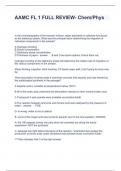
-
AAMC EXAM BUNDLE
- Package deal • 20 items • 2024
-
- $37.49
- + learn more
Exam (elaborations) AAMC 1 FULL REVIEW- PSYCH,SOC QUESTIONS WITH CORRECT ANSWERS 2024 Exam (elaborations) AAMC FL 1 FULL REVIEW- Bio,Biochem Questions and Answers 2024 Exam (elaborations) AAMC FL 1 FULL REVIEW- Chem,Phys Questions and Answers 2024 Exam (elaborations) AAMC FL 2 Chem,Phys Questions with correct Answers Exam (elaborations) AA
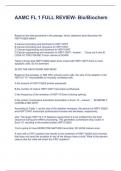
-
AAMC TEST COMPILATION BUNDLE FULL SEMESTER 2023
- Package deal • 21 items • 2023
-
- $45.49
- + learn more
Exam (elaborations) AAMC 1 FULL REVIEW- PSYCH,SOC QUESTIONS AND ANSWERS 2023 Exam (elaborations) AAMC FL 1 FULL REVIEW- Bio,Biochem Questions and Answers Scored A+2023 Exam (elaborations) AAMC FL 1 FULL REVIEW- Chem,Phys Questions and Answers 2023 Exam (elaborations) AAMC FL 2 Chem,Phys Questions and Answers Latest updated 2023 Exam (elabo
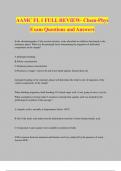
-
AAMC FL 1 FULL REVIEW- Chem-Phys Exam Questions and Answers
- Exam (elaborations) • 23 pages • 2024
-
- $13.49
- + learn more
AAMC FL 1 FULL REVIEW- Chem-Phys Exam Questions and Answers In the chromatography of the reaction mixture, water absorbed on cellulose functioned as the stationary phase. What was the principal factor determining the migration of individual components in the sample? A.Hydrogen bonding B.Solute concentration C.Stationary phase concentration D.Thickness of paper -Answer-B and D are dumb options. Knock them out. hydrogen bonding to the stationary phase will determine the relative rate of m...
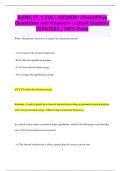
-
AAMC FL 1 FULL REVIEW- Chem/Phys Questions and Answers | Latest Update | 2024/2025 | 100% Pass
- Exam (elaborations) • 46 pages • 2024
- Available in package deal
-
- $11.73
- + learn more
AAMC FL 1 FULL REVIEW- Chem/Phys Questions and Answers | Latest Update | 2024/2025 | 100% Pass What is the primary function of a catalyst in a chemical reaction? - A) To increase the reaction temperature - B) To shift the equilibrium position - C) To lower the activation energy - D) To change the equilibrium constant C) To lower the activation energy Rationale: A catalyst speeds up a chemical reaction by providing an alternative reaction pathway with a lower activation energ...

-
BUNDLE OF AAMC QUESTION AND ANSWER 2023
- Package deal • 28 items • 2023
-
- $40.49
- + learn more
AAMC FL 2 Chem/Phys Question and answer 100% solved 2023 Exam (elaborations) AAMC FL #2 Question with complete solution 2023 Exam (elaborations) C/P AAMC Fl #3 Question with complete solution 2023 Exam (elaborations) AAMC MCAT Biochemistry Question and answer rated A+ Exam (elaborations) AAMC FL 4 BB Question with complete solution 2023 E
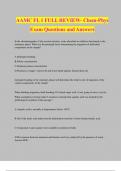
-
AAMC FL 1 FULL REVIEW- Chem-Phys Exam Questions and Answers
- Exam (elaborations) • 23 pages • 2024
-
- $13.49
- + learn more
AAMC FL 1 FULL REVIEW- Chem-Phys Exam Questions and Answers In the chromatography of the reaction mixture, water absorbed on cellulose functioned as the stationary phase. What was the principal factor determining the migration of individual components in the sample? A.Hydrogen bonding B.Solute concentration C.Stationary phase concentration D.Thickness of paper -Answer-B and D are dumb options. Knock them out. hydrogen bonding to the stationary phase will determine the relative rate of m...
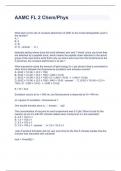
-
AAMC FL 2 Chem,Phys Questions and Answers 2024
- Exam (elaborations) • 14 pages • 2024
- Available in package deal
-
- $12.49
- + learn more
AAMC FL 2 Chem,Phys

That summary you just bought made someone very happy. Also get paid weekly? Sell your study resources on Stuvia! Discover all about earning on Stuvia


